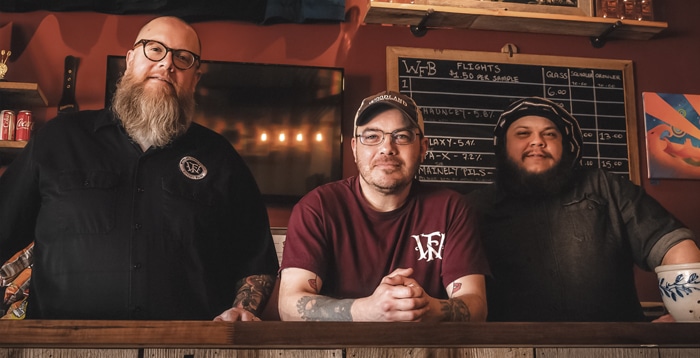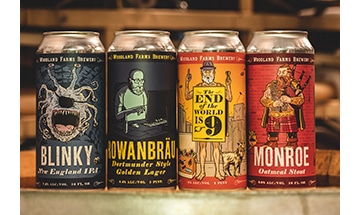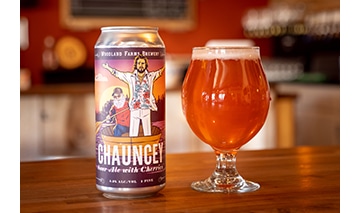
Woodland Farms Brews Boldly
Nestled between a Weathervane restaurant and a Starbucks, and directly across from the Kittery Trading Post in southern Maine, Woodland Farms Brewery is quietly making its mark amongst the giants in the regional beer scene.
 The tasting room is comfortable and clean, marked by flash tattoo art displayed amongst the Mexican candy skulls and a hardwood bar – reclaimed from a barn owned by the family that gave the brewery its namesake. It feels like a comfortable living room that proudly grew from punk rock roots. Patrick Rowan, owner and head brewer, has decided to fuse a portion of his family legacy (a dairy farm a mile away from their present location) with his passion for well-made ales and lagers. He has been steering the brewhouse to make things that aren’t commonly found in such a small start-up. “There’s integrity in making what you love,” noted Rowan. Dedicating time to brewing a wide array of less popular, or even difficult to produce styles may not be the most economically sensible, but the product is nonetheless delicious.
The tasting room is comfortable and clean, marked by flash tattoo art displayed amongst the Mexican candy skulls and a hardwood bar – reclaimed from a barn owned by the family that gave the brewery its namesake. It feels like a comfortable living room that proudly grew from punk rock roots. Patrick Rowan, owner and head brewer, has decided to fuse a portion of his family legacy (a dairy farm a mile away from their present location) with his passion for well-made ales and lagers. He has been steering the brewhouse to make things that aren’t commonly found in such a small start-up. “There’s integrity in making what you love,” noted Rowan. Dedicating time to brewing a wide array of less popular, or even difficult to produce styles may not be the most economically sensible, but the product is nonetheless delicious.
In order to achieve financial viability, a smaller brewery typically sticks to brews with massive crowd appeal and with fast turnover in production. This ensures that product moves out the door and cash flow is strong in the tasting room. This cash flow enables breweries to start their fringe projects, taking gambles on styles that are less well known to the public, using the mass appeal to finance their passion projects. Woodland Farms understands this, and while they still produce a popular New England style IPA and a pale ale that are crowd pleasers, Rowan knew that he wanted to make beer that satisfied his love of styles that are less appreciated in the region. Two years ago, when they opened the brewery, they debuted a Mexican-style lager and a turbidly mashed lambic-style sour ale. Neither of these are known to be large sellers among local breweries, nor are they easy to produce well. The line up at Woodland Farms carries clean and sour fermentations, lagers and ales and they do this using only a three-barrel brewhouse, which takes a lot of extra time and energy to produce, using processes and protocols that most fledgling breweries wouldn’t dare to attempt. A basic ale can be fermented and onto draft lines in under two weeks, but a traditionally made lager takes almost 45 days. A lambic-style sour? Up to three years for the right blend of tartness and body while being aged in oak barrels (an added cost, mind you). In order to fulfill their need to distribute and keep the tasting room ready to serve, it led to 14-hour shifts doing triple batches to fill up fermenters. “We are always moving . . . it’s a perpetual flywheel,” noted Rowan.
 Woodland Farms server Michael Enright echoed that the brewery isn’t “beholden to the same style trends as others.” Their small size and commitment to unique beers such as a Dortmunder-style lager, dry Irish stouts, Munich dunkels, or solara-method sours are there to create “balance across [a spectrum] of styles,” he said. Last year, the staff made a pilgrimage to Germany and Belgium to get focused on the origin stories that comprise historic beer styles by touring storied brewhouses and meeting with brewers. Rowan considers the pale ale and IPAs to be gateway vehicles to bring consumers in and then educate them that beer’s roots go deep and in many directions.
Woodland Farms server Michael Enright echoed that the brewery isn’t “beholden to the same style trends as others.” Their small size and commitment to unique beers such as a Dortmunder-style lager, dry Irish stouts, Munich dunkels, or solara-method sours are there to create “balance across [a spectrum] of styles,” he said. Last year, the staff made a pilgrimage to Germany and Belgium to get focused on the origin stories that comprise historic beer styles by touring storied brewhouses and meeting with brewers. Rowan considers the pale ale and IPAs to be gateway vehicles to bring consumers in and then educate them that beer’s roots go deep and in many directions.
With spring in the air, and with warmer temps, consider grabbing their Medico Mexican-style lager or something like Ruby Slippers or Chauncey – a pair of sours aged over fruits. Medico is an excellent, dry, crisp lager with bright minerality and would be quenching in the heat. Chauncey, a sour ale fermented saison style, aged over dark cherries, is reminiscent of a bold Berliner Weisse. Woodland Farms puts in the time to create a breadth of offerings with a width of flavors.
— Text: Matthew Brown. Matt is a resident of Portland, a Certified Beer Server in the Cicerone Program, and an avid homebrewer.









